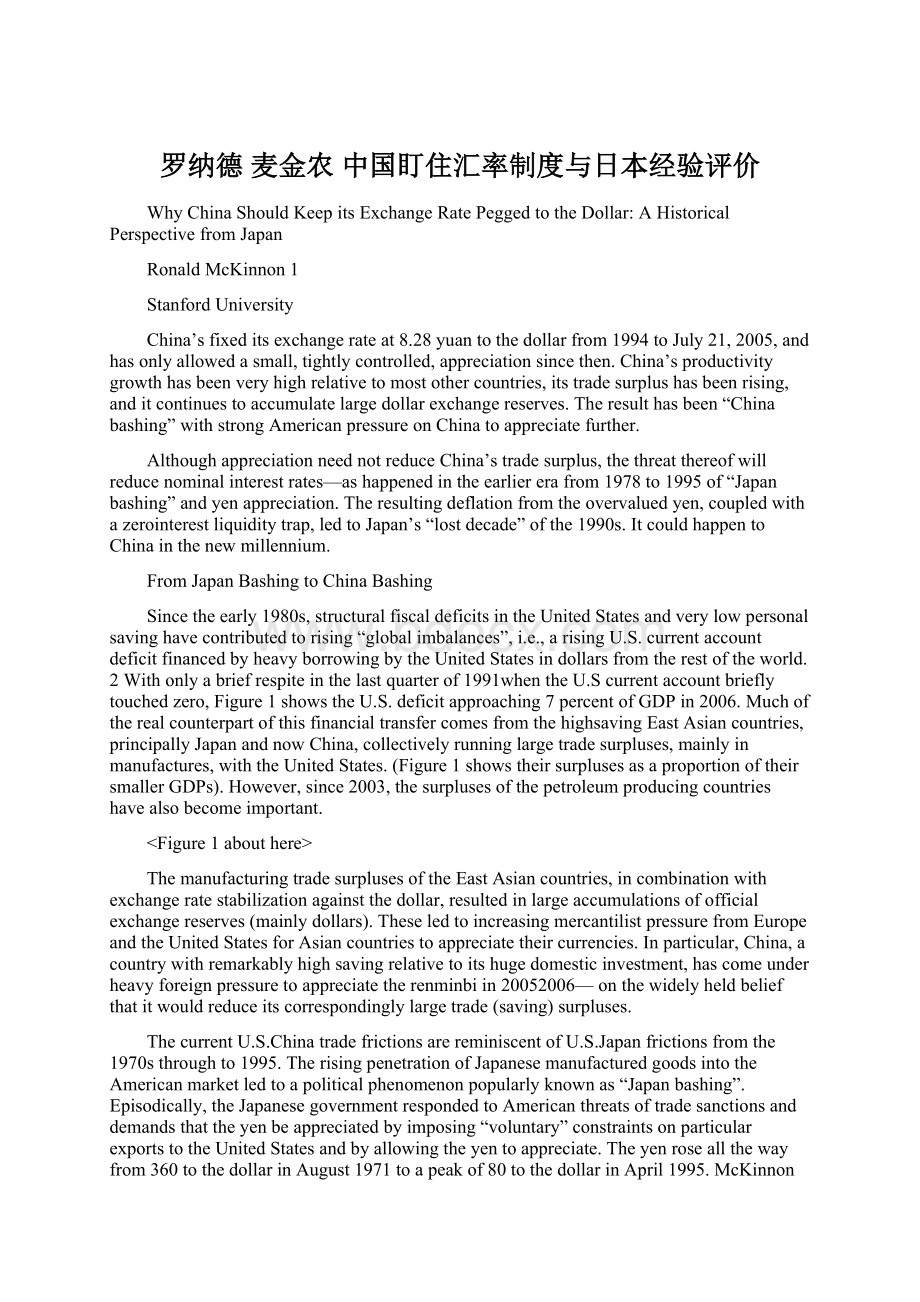罗纳德 麦金农 中国盯住汇率制度与日本经验评价文档格式.docx
《罗纳德 麦金农 中国盯住汇率制度与日本经验评价文档格式.docx》由会员分享,可在线阅读,更多相关《罗纳德 麦金农 中国盯住汇率制度与日本经验评价文档格式.docx(12页珍藏版)》请在冰豆网上搜索。

AHistoricalPerspectivefromJapan
RonaldMcKinnon1
StanfordUniversity
China’sfixeditsexchangerateat8.28yuantothedollarfrom1994toJuly21,2005,andhasonlyallowedasmall,tightlycontrolled,appreciationsincethen.China’sproductivitygrowthhasbeenveryhighrelativetomostothercountries,itstradesurplushasbeenrising,anditcontinuestoaccumulatelargedollarexchangereserves.Theresulthasbeen“Chinabashing”withstrongAmericanpressureonChinatoappreciatefurther.
AlthoughappreciationneednotreduceChina’stradesurplus,thethreatthereofwillreducenominalinterestrates—ashappenedintheearliererafrom1978to1995of“Japanbashing”andyenappreciation.Theresultingdeflationfromtheovervaluedyen,coupledwithazerointerestliquiditytrap,ledtoJapan’s“lostdecade”ofthe1990s.ItcouldhappentoChinainthenewmillennium.
FromJapanBashingtoChinaBashing
Sincetheearly1980s,structuralfiscaldeficitsintheUnitedStatesandverylowpersonalsavinghavecontributedtorising“globalimbalances”,i.e.,arisingU.S.currentaccountdeficitfinancedbyheavyborrowingbytheUnitedStatesindollarsfromtherestoftheworld.2Withonlyabriefrespiteinthelastquarterof1991whentheU.Scurrentaccountbrieflytouchedzero,Figure1showstheU.S.deficitapproaching7percentofGDPin2006.MuchoftherealcounterpartofthisfinancialtransfercomesfromthehighsavingEastAsiancountries,principallyJapanandnowChina,collectivelyrunninglargetradesurpluses,mainlyinmanufactures,withtheUnitedStates.(Figure1showstheirsurplusesasaproportionoftheirsmallerGDPs).However,since2003,thesurplusesofthepetroleumproducingcountrieshavealsobecomeimportant.
<
Figure1abouthere>
ThemanufacturingtradesurplusesoftheEastAsiancountries,incombinationwithexchangeratestabilizationagainstthedollar,resultedinlargeaccumulationsofofficialexchangereserves(mainlydollars).TheseledtoincreasingmercantilistpressurefromEuropeandtheUnitedStatesforAsiancountriestoappreciatetheircurrencies.Inparticular,China,acountrywithremarkablyhighsavingrelativetoitshugedomesticinvestment,hascomeunderheavyforeignpressuretoappreciatetherenminbiin20052006—onthewidelyheldbeliefthatitwouldreduceitscorrespondinglylargetrade(saving)surpluses.
ThecurrentU.S.ChinatradefrictionsarereminiscentofU.S.Japanfrictionsfromthe1970sthroughto1995.TherisingpenetrationofJapanesemanufacturedgoodsintotheAmericanmarketledtoapoliticalphenomenonpopularlyknownas“Japanbashing”.Episodically,theJapanesegovernmentrespondedtoAmericanthreatsoftradesanctionsanddemandsthattheyenbeappreciatedbyimposing“voluntary”constraintsonparticularexportstotheUnitedStatesandbyallowingtheyentoappreciate.Theyenroseallthewayfrom360tothedollarinAugust1971toapeakof80tothedollarinApril1995.McKinnonandOhno(1997)showedthattheeverhigheryencausedadeflationaryslumpintheJapaneseeconomywithazerointerestrateliquiditytrap,butwithoutreducingJapan’scurrentaccountsurplusesmeasuredasaproportionofitsGNP.
WorriedabouttheslumpingJapaneseeconomy,theU.S.TreasurySecretary,RobertRubininApril1995announcedanew“strongdollar”policy,afterwhichJapanbashingmoreorlessceased.AlthoughawelcomechangeinAmericanpolicy,itcametoolatetopreventJapan’s“lostdecade”ofthe1990s.
Japanbashingfrom1978to1995occurredwhenJapanhadtheworld’slargestbilateraltradesurpluswiththeUnitedStates(Figure2).JapanwasthenAmerica’sforemostindustrialcompetitor—notonlyinheavyindustrysuchassteel,autosandmachinetoolsbutalsoinhightechnologysuchascolortelevisionsandsemiconductors.
America’sprotectionistthreatswereusuallyspecifictoaparticularindustrywithinsomeshorttimeframe.TheJapanesewouldoftenrespondseriallybytemporarilyrestrainingexportsinsteel,autos,semiconductors,andsoon.Butalsogeneralyenappreciation,whichwasnottemporary,oftenaccompaniedthesespecificindustrialdisputes—resultingin“thesyndromeoftheeverhigheryen”(McKinnonandOhno,Ch.1).
Figure2abouthere>
Inthenewmillennium,historyisrepeatingitself.ChinabashingisnowsupersedingJapanbashing.Figure2showsChina’sbilateraltradesurpluswiththeUnitedStatesrisingfrombeingtriviallysmallinthe1980stoequalJapan’sby2000,andthenbecomingmorethantwiceaslargeasJapan’sin2005—nowreachingmorethan1.5percentofAmerica’sGDP.
UnlikeJapan’searliermoreconcentratedexportsurgesintospecificAmericanmarketsforadvancedmanufactures,China’sexportsurgeismoreinlightandmediumtechindustryandis“acrosstheboard”.Chinahasbecomemainlyanexporteroffinishedconsumergoods.ValueaddedinmostindividualChineseproductsisnothighbecauseinputsofcapitalgoods,subassemblies,andavarietyindustrialinputsincludingbasicmineralsandpetroleumproductsarelargelyimported.ChinaismerelythefaceofaworldwideexportsurgeintothesavingdeficientAmericaneconomy.BothJapanandGermanyaswellasseveralsmallerEastAsiancountriesnowhavebilateraltradesurpluseswithChina.Nevertheless,atChristmastime,whenAmericanfamiliesopentheirpresents,theyseemainlymadeinChinalabels!
Whilegoodforconsumers,producersblamecontractingemploymentinAmericanmanufacturingoncompetitionfromChinesemanufactures.TheconsequentriseinChinabashingismorefocusedondemandingthattherenminbibeappreciatedtoreducetheinternationalcompetitivenessofChineseindustrygenerally,ratherthanonindustryspecificprotectionismasintheearlierJapaneseexperience3.Otherthancontinualjawboning,AmericanofficialpressureonChinatoappreciatehastakentwospecificforms.FirstisabillintroducedintotheU.S.CongressinMarch2005toimposea27.5percenttariffonallU.S.importsfromChinaunlesstherenminbiwassubstantiallyappreciated.ThiswouldhavebeenanegregiousviolationofAmerica’sWTOcommitments.Ifpassed,itwouldbesimilartothe“Nixonshock”ofAugust1971whenheimposedatariffonimportedmanufacturesthatwasnotrescindeduntilalltheindustrialcountries—includingJapanbutnotChina—agreedtoappreciateinDecember1971.However,afterChinaspeededupitsrateofappreciationinAugustandSeptemberof2006,SenatorsSchumerofNewYorkandGrahamofSouthCarolinaagreedtowithdrawthebill.Butnextyear,theythreatentocraftamoreWTOcompliantmeasuretoforceChinatofurtherreformitscurrencypractices.
Second,everyyearinMayunderSection3004ofU.S.PublicLaw100418,theSecretaryoftheTreasuryisrequiredtoassesswhethercountriessuchasChinathathaveglobalcurrentaccountsurpluses,orlargebilateraltradesurpluseswiththeUnitedStates,aremanipulatingexchangeratestopreventeffectivebalanceofpaymentsadjustmentortogainanunfairadvantageininternationaltrade,withunspecifiedsanctionstofollowifhedoes.InMay2006,afterbeingheavilylobbiedbyindustryandlaborgroupstosanctionChina,theSecretarynarrowlydecidednottoofficiallyclassifyChinatobeacurrencymanipulator.However,hewarnedthatthisdecisioncouldchangeinthefutureiftherenminbididnotappreciate,awarningbasedonthemistakenpresumptionthatanappreciationwouldreduceChina’stradesurplus.
Consequently,wenowliveinworldwhere,althoughtherenminbihasnotyetappreciatedverymuch,astrongexpectationexiststhatitwillbehigheragainstthedollarinthefuture.
ThePoliticalEconomyoftheTradeImbalance
ChinabashingnowandJapanbashingearlierisboth“political”and“economic”.
Onthepoliticalside,thelossofjobsinAmericanmanufacturingarousestheireoftradeunionsandtheNationalAssociationofManufacturers.Unsurprisingly,Congressmenfromstateswithlargemanufacturingsectorshavebeenthemostvociferousindemandingthatsomethingbedoneaboutit.BlamingforeignersformisalignedexchangeratesiseasierthanfacinguptotheproblemofinadequateprivatesavingandlargestructuralfiscaldeficitsintheUnitedStates.
Butpoliticalpopulismisonlypartoftheproblem.Badeconomictheorizingisatleastasculpable.Mostmainstreameconomistsbelievethatagovernmentscancontrolitsreal(inflationadjusted)exchangerate,andtherebycontroltherealtradebalance.
Unfortunately,thispresumptionhasbeencanonizedinamodelcalledtheelasticitiesapproachto(ormodelof)thebalanceoftrade.Becausethiselasticitiesmodelfocusesnarrowlyontherelativepriceeffectsofchangesinrealexchangerates,itisseriouslyincomplete.Therealityisthatgovernmentscanatmostcontrolnominalexchangerates,forwhichanychangecanonlybesustainedbyalteringthestanceofthenationalmonetarypolicy.Sothemacroeconomicrepercussionsofsustainedexchangeratechangesarelarge,andnotadequatelytreatedwithintheelasticitiesmodel.
Foraninternationalcreditor,asaremostEastAsianeconomies,theincomeandspendingrepercussionsofasharpdiscreteappreciationagainsttheworld’sdominantmoneyaresostrongthattheeffectofcurrencyappreciationonitstradesurplusisambiguous.Toseethis,letusfocusonhowacreditoreconomywithatradesurpluswouldreacttoadiscretecurrencyappreciationintheshortandmediumtermswhendomesticpricesremainsomewhat“sticky”.Becauseanappreciatingcountry’sexportsbecomeobviouslymoreexpensiveinworldmarketsanddecline,whereasimportslookcheaperinthedomesticc